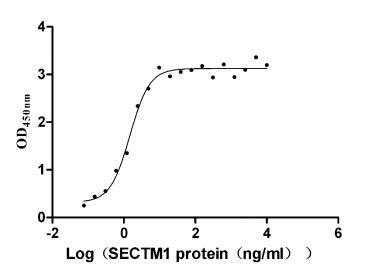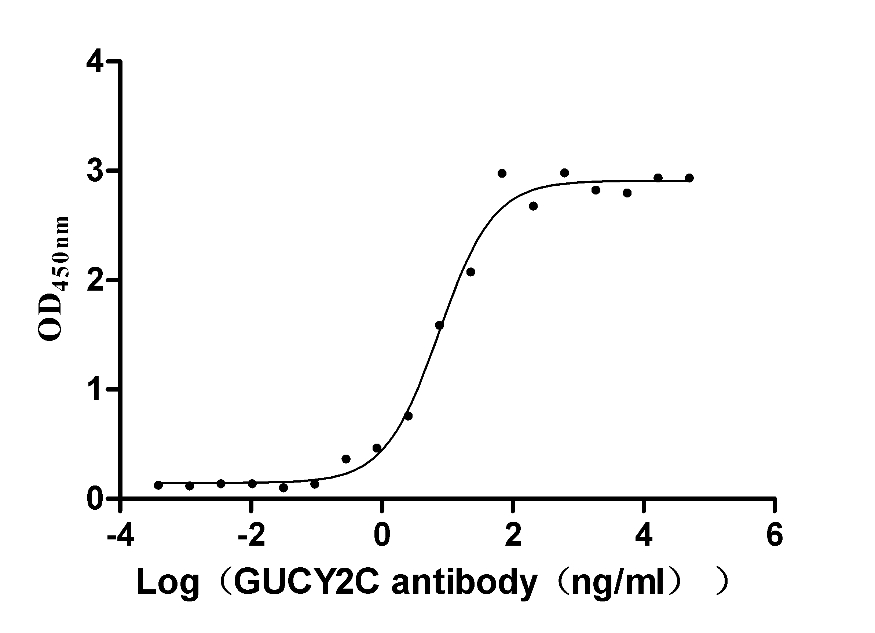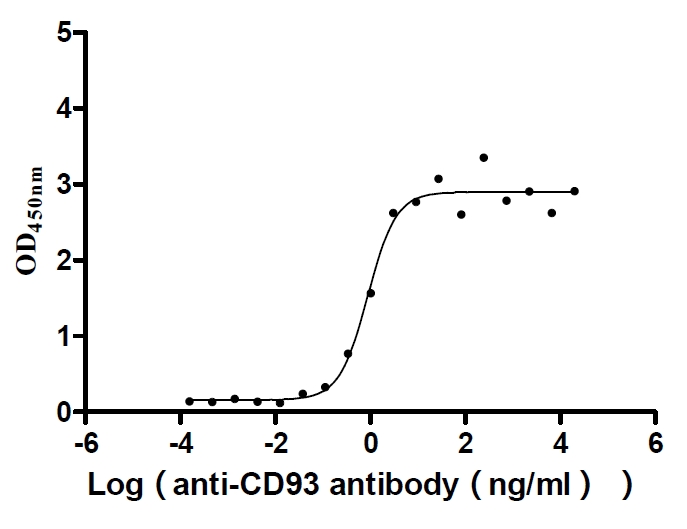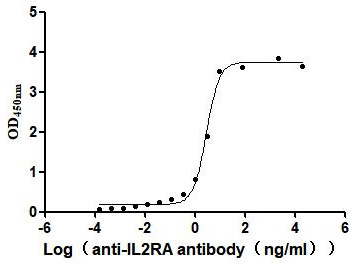Recombinant Mouse Aldose reductase (Akr1b1)
-
中文名称:Recombinant Mouse Aldose reductase(Akr1b1),Yeast
-
货号:CSB-YP001539MO
-
规格:
-
来源:Yeast
-
其他:
-
中文名称:Recombinant Mouse Aldose reductase(Akr1b1),Yeast
-
货号:CSB-EP001539MO
-
规格:
-
来源:E.coli
-
其他:
-
中文名称:Recombinant Mouse Aldose reductase(Akr1b1),Yeast
-
货号:CSB-EP001539MO-B
-
规格:
-
来源:E.coli
-
共轭:Avi-tag Biotinylated
E. coli biotin ligase (BirA) is highly specific in covalently attaching biotin to the 15 amino acid AviTag peptide. This recombinant protein was biotinylated in vivo by AviTag-BirA technology, which method is BriA catalyzes amide linkage between the biotin and the specific lysine of the AviTag.
-
其他:
-
中文名称:Recombinant Mouse Aldose reductase(Akr1b1),Yeast
-
货号:CSB-BP001539MO
-
规格:
-
来源:Baculovirus
-
其他:
-
中文名称:Recombinant Mouse Aldose reductase(Akr1b1),Yeast
-
货号:CSB-MP001539MO
-
规格:
-
来源:Mammalian cell
-
其他:
产品详情
-
纯度:>85% (SDS-PAGE)
-
基因名:Akr1b1
-
Uniprot No.:
-
别名:Akr1b1; Akr1b3; Aldor1; Aldr1; Alr2; Aldo-keto reductase family 1 member B1; EC 1.1.1.300; EC 1.1.1.372; EC 1.1.1.54; Aldehyde reductase; Aldo-keto reductase family 1 member B3; Aldose reductase; AR; EC 1.1.1.21
-
种属:Mus musculus (Mouse)
-
蛋白长度:Full Length of Mature Protein
-
表达区域:2-316
-
氨基酸序列ASHLELNNG TKMPTLGLGT WKSPPGQVTE AVKVAIDLGY RHIDCAQVYQ NEKEVGVALQ EKLKEQVVKR QDLFIVSKLW CTFHDKSMVK GAFQKTLSDL QLDYLDLYLI HWPTGFKPGP DYFPLDASGN VIPSDTDFVD TWTAMEQLVD EGLVKTIGVS NFNPLQIERI LNKPGLKYKP AVNQIECHPY LTQEKLIEYC HSKGIVVTAY SPLGSPDRPW AKPEDPSLLE DPRIKAIAAK YNKTTAQVLI RFPIQRNLVV IPKSVTPVRI AENLKVFDFE VSSEDMATLL SYNRNWRVCA LMSCAKHKDY PFHAEV
-
蛋白标签:Tag type will be determined during the manufacturing process.
The tag type will be determined during production process. If you have specified tag type, please tell us and we will develop the specified tag preferentially. -
产品提供形式:Lyophilized powder
Note: We will preferentially ship the format that we have in stock, however, if you have any special requirement for the format, please remark your requirement when placing the order, we will prepare according to your demand. -
复溶:We recommend that this vial be briefly centrifuged prior to opening to bring the contents to the bottom. Please reconstitute protein in deionized sterile water to a concentration of 0.1-1.0 mg/mL.We recommend to add 5-50% of glycerol (final concentration) and aliquot for long-term storage at -20℃/-80℃. Our default final concentration of glycerol is 50%. Customers could use it as reference.
-
储存条件:Store at -20°C/-80°C upon receipt, aliquoting is necessary for mutiple use. Avoid repeated freeze-thaw cycles.
-
保质期:The shelf life is related to many factors, storage state, buffer ingredients, storage temperature and the stability of the protein itself.
Generally, the shelf life of liquid form is 6 months at -20°C/-80°C. The shelf life of lyophilized form is 12 months at -20°C/-80°C. -
货期:Delivery time may differ from different purchasing way or location, please kindly consult your local distributors for specific delivery time.Note: All of our proteins are default shipped with normal blue ice packs, if you request to ship with dry ice, please communicate with us in advance and extra fees will be charged.
-
注意事项:Repeated freezing and thawing is not recommended. Store working aliquots at 4°C for up to one week.
-
Datasheet :Please contact us to get it.
靶点详情
-
功能:Catalyzes the NADPH-dependent reduction of a wide variety of carbonyl-containing compounds to their corresponding alcohols. Displays enzymatic activity towards endogenous metabolites such as aromatic and aliphatic aldehydes, ketones, monosacharides, bile acids and xenobiotics substrates. Key enzyme in the polyol pathway, catalyzes reduction of glucose to sorbitol during hyperglycemia. Reduces steroids and their derivatives and prostaglandins. Displays low enzymatic activity toward all-trans-retinal, 9-cis-retinal, and 13-cis-retinal. Catalyzes the reduction of diverse phospholipid aldehydes such as 1-palmitoyl-2-(5-oxovaleroyl)-sn -glycero-3-phosphoethanolamin (POVPC) and related phospholipid aldehydes that are generated from the oxydation of phosphotidylcholine and phosphatdyleethanolamides. Plays a role in detoxifying dietary and lipid-derived unsaturated carbonyls, such as crotonaldehyde, 4-hydroxynonenal, trans-2-hexenal, trans-2,4-hexadienal and their glutathione-conjugates carbonyls (GS-carbonyls).
-
基因功能参考文献:
- modulation of macrophage metabolism by inhibition of AR might represent a novel strategy to modulate host defense responses and to modify metabolism to promote macrophage hypertrophy and phagocytosis under inflammatory conditions PMID: 28111134
- Aldose reductase acts as a switch which can regulate microglia by polarizing cells after spinal cord injury. PMID: 25520004
- AR overexpression elevates retinal microglia activation in retina. PMID: 27033597
- Aldose reductase contributes to diabetes-mediated mitochondrial dysfunction and damage through the activation of p53. PMID: 24474649
- Data indicate that inhibition of AR alleviates the MCD diet-induced liver inflammation and fibrosis in db/db mice, probably through dampening CYP2E1 mediated-oxidative stress and ameliorating the expression of pro-inflammatory cytokines. PMID: 24066058
- FMHM suppressed the activity of AR-dependent phospholipase C/protein kinase C signaling, which further resulted in downstream inactivation of the IkappaB kinase/IkappaB/nuclear factor-kappa B inflammatory pathway. PMID: 24021941
- AR is a critical regulator of protein carnosinylation and carnosine-mediated tissue protection PMID: 23928303
- Allergen-induced airway remodeling is mediated by AR and its inhibition blocks the progression of remodeling via inhibiting TGFbeta1-induced Smad-independent and PI3K/AKT/GSK3beta-dependent pathway. PMID: 23460857
- BGG-mediated inhibition of aldose reductase prevented LPS-induced activation of JNK. PMID: 23247009
- Activation of AR in podocytes may be implicated in diabetic podocytopathy. PMID: 22253613
- crystal of AKR1B3 was tetragonal, belonging to space group P4(1)2(1)2 or P4(3)2(1)2, with unit-cell parameters a = b = 107.62, c = 120.76 A PMID: 22139184
- the role of AKR1B3 in regulating advanced glycosylation end products and advanced lipoxidation end products PMID: 21276777
- Genetic deficiency of Ar significantly ameliorated development of key endpoints linked with early diabetic nephropathy in vivo. PMID: 21267539
- a Y48F/H110F double mutant of AKR1B3 completely lost PGDS activity and showed only 2.9% of PGFS activity PMID: 21306562
- Sequential catalysis of Aldr1 by glutathione S-transferase P and glutaredoxin may be a general redox switching mechanism that regulates the reduction of protein sulfenic acids to cysteines regulates the reduction of protein sulfenic acids to cysteines PMID: 20538586
- regulates LPS-induced glucose uptake and expression of glucose transporter-3 in macrophages PMID: 20348015
- The present study indicates that inhibition of aldose reductase in diabetics may protect against damage in the brain and retina following ischemic reperfusion injury. PMID: 20143423
- These results indicate that AR plays an important role in diabetes-associated impaired nerve regeneration, in part by affecting vascularization and macrophage invasion during Wallerian degeneration. PMID: 20142761
- AKR1B3 acts as the PGFS in adipocytes and AKR1B3-produced PGF(2alpha) suppresses adipocyte differentiation by acting through FP receptors PMID: 20093363
- Nrf2 protein regulated the AKR1B3 promoter activity via antioxidant response elements (ARE1) and the activator protein 1 site (AP1). PMID: 15655294
- The role of AR in the pathogenesis of diabetic retinopathy was studied in mice with an AR null mutation. PMID: 16249434
- Aldose reductase not only plays important roles in osmoregulation and medullary cell survival but may also be essential for the full maturation of the urine concentrating mechanism. PMID: 16449351
- Increased polyol pathway flux through AR is a major contributing factor in the early signs of diabetic neuropathy, possibly through depletion of glutathione, increased superoxide accumulation, increased jn terminal kinase activation, and DNA damage. PMID: 16804062
- reduced glutathionyl-4-hydroxynonanal-lipid aldehydes catalyzed by AR propagate lipopolysaccharide-induced production of inflammatory markers PMID: 16956889
- Aldose reductase mediates endotoxin-induced inflammation and cardiomyopathy PMID: 17030682
- Catalyzes lipid aldehyde-glutathione conjugates regulate the lipopolysacchaide-induced production of inflammatory marker nitric oxide and cytotoxicity in RAW 264.7 macrophage cells. PMID: 17382209
- AR plays an important role in the regulation of hepatic PPARalpha phosphorylation and activity and lipid homeostasis PMID: 18445591
- EGFR-Ras-MAPK pathway contributes to TonEBP transcriptional activation and targets gene expression during osmotic stress, thus establishing a membrane-associated signal input that contributes to the regulation of TonEBP activity PMID: 19225051
- Aldose reductase protects against early atherosclerotic lesion formation in apolipoprotein E-null mice. PMID: 19729598
- Inhibition of aldose reductase prevents oxidant-induced inflammatory signals leading to cytotoxicity in small airway epithelial cells and ovalbumin-induced airway inflammation in mice. PMID: 19752229
显示更多
收起更多
-
亚细胞定位:Cytoplasm.
-
蛋白家族:Aldo/keto reductase family
-
组织特异性:Abundant in the testis, skeletal muscle and kidney.
-
数据库链接:
KEGG: mmu:11677
STRING: 10090.ENSMUSP00000100045
UniGene: Mm.389126
Most popular with customers
-
Recombinant Human T-cell antigen CD7 (CD7), partial (Active)
Express system: Mammalian cell
Species: Homo sapiens (Human)
-
Recombinant Human Heat-stable enterotoxin receptor (GUCY2C), partial (Active)
Express system: Mammalian cell
Species: Homo sapiens (Human)
-
Recombinant Human Complement component C1q receptor (CD93), partial (Active)
Express system: Mammalian cell
Species: Homo sapiens (Human)
-
Recombinant Human Interleukin-2 receptor subunit alpha (IL2RA), partial (Active)
Express system: Mammalian cell
Species: Homo sapiens (Human)
-
Recombinant DT3C (Diphtheria toxin & spg 3C domain) for Antibody Internalization Assay (Active)
Express system: E.coli
Species: N/A

















